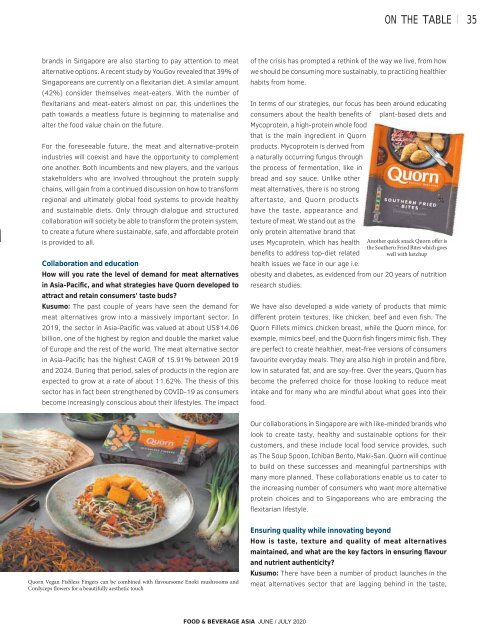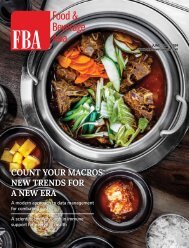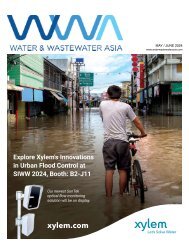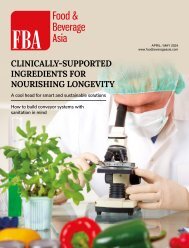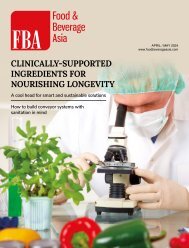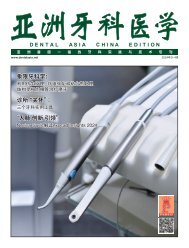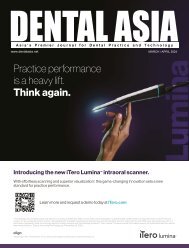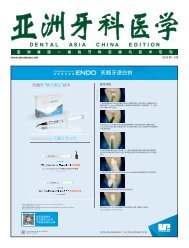Food & Beverage Asia June/July 2020
Food & Beverage Asia (FBA) is the leading source of food and beverage news in Asia since 2002. FBA delivers a comprehensive view of the food and beverage landscape, spanning across the latest health and nutrition trends and industry innovations in ingredients, recipe formulations, food science, sustainability, packaging, and automation, as well as advancements in agri and food-tech.
Food & Beverage Asia (FBA) is the leading source of food and beverage news in Asia since 2002. FBA delivers a comprehensive view of the food and beverage landscape, spanning across the latest health and nutrition trends and industry innovations in ingredients, recipe formulations, food science, sustainability, packaging, and automation, as well as advancements in agri and food-tech.
Create successful ePaper yourself
Turn your PDF publications into a flip-book with our unique Google optimized e-Paper software.
ON THE TABLE 35<br />
brands in Singapore are also starting to pay attention to meat<br />
alternative options. A recent study by YouGov revealed that 39% of<br />
Singaporeans are currently on a flexitarian diet. A similar amount<br />
(42%) consider themselves meat-eaters. With the number of<br />
flexitarians and meat-eaters almost on par, this underlines the<br />
path towards a meatless future is beginning to materialise and<br />
alter the food value chain on the future.<br />
For the foreseeable future, the meat and alternative-protein<br />
industries will coexist and have the opportunity to complement<br />
one another. Both incumbents and new players, and the various<br />
stakeholders who are involved throughout the protein supply<br />
chains, will gain from a continued discussion on how to transform<br />
regional and ultimately global food systems to provide healthy<br />
and sustainable diets. Only through dialogue and structured<br />
collaboration will society be able to transform the protein system,<br />
to create a future where sustainable, safe, and affordable protein<br />
is provided to all.<br />
Collaboration and education<br />
How will you rate the level of demand for meat alternatives<br />
in <strong>Asia</strong>-Pacific, and what strategies have Quorn developed to<br />
attract and retain consumers’ taste buds?<br />
Kusumo: The past couple of years have seen the demand for<br />
meat alternatives grow into a massively important sector. In<br />
2019, the sector in <strong>Asia</strong>-Pacific was valued at about US$14.06<br />
billion, one of the highest by region and double the market value<br />
of Europe and the rest of the world. The meat alternative sector<br />
in <strong>Asia</strong>-Pacific has the highest CAGR of 15.91% between 2019<br />
and 2024. During that period, sales of products in the region are<br />
expected to grow at a rate of about 11.62%. The thesis of this<br />
sector has in fact been strengthened by COVID-19 as consumers<br />
become increasingly conscious about their lifestyles. The impact<br />
of the crisis has prompted a rethink of the way we live, from how<br />
we should be consuming more sustainably, to practicing healthier<br />
habits from home.<br />
In terms of our strategies, our focus has been around educating<br />
consumers about the health benefits of plant-based diets and<br />
Mycoprotein, a high-protein whole food<br />
that is the main ingredient in Quorn<br />
products. Mycoprotein is derived from<br />
a naturally occurring fungus through<br />
the process of fermentation, like in<br />
bread and soy sauce. Unlike other<br />
meat alternatives, there is no strong<br />
aftertaste, and Quorn products<br />
have the taste, appearance and<br />
texture of meat. We stand out as the<br />
only protein alternative brand that<br />
uses Mycoprotein, which has health Another quick snack Quorn offer is<br />
the Southern Fried Bites which goes<br />
benefits to address top-diet related<br />
well with ketchup<br />
health issues we face in our age i.e.<br />
obesity and diabetes, as evidenced from our 20 years of nutrition<br />
research studies.<br />
We have also developed a wide variety of products that mimic<br />
different protein textures, like chicken, beef and even fish. The<br />
Quorn Fillets mimics chicken breast, while the Quorn mince, for<br />
example, mimics beef, and the Quorn fish fingers mimic fish. They<br />
are perfect to create healthier, meat-free versions of consumers<br />
favourite everyday meals. They are also high in protein and fibre,<br />
low in saturated fat, and are soy-free. Over the years, Quorn has<br />
become the preferred choice for those looking to reduce meat<br />
intake and for many who are mindful about what goes into their<br />
food.<br />
Our collaborations in Singapore are with like-minded brands who<br />
look to create tasty, healthy and sustainable options for their<br />
customers, and these include local food service provides, such<br />
as The Soup Spoon, Ichiban Bento, Maki-San. Quorn will continue<br />
to build on these successes and meaningful partnerships with<br />
many more planned. These collaborations enable us to cater to<br />
the increasing number of consumers who want more alternative<br />
protein choices and to Singaporeans who are embracing the<br />
flexitarian lifestyle.<br />
Quorn Vegan Fishless Fingers can be combined with flavoursome Enoki mushrooms and<br />
Cordyceps flowers for a beautifully aesthetic touch<br />
Ensuring quality while innovating beyond<br />
How is taste, texture and quality of meat alternatives<br />
maintained, and what are the key factors in ensuring flavour<br />
and nutrient authenticity?<br />
Kusumo: There have been a number of product launches in the<br />
meat alternatives sector that are lagging behind in the taste,<br />
FOOD & BEVERAGE ASIA JUNE / JULY <strong>2020</strong>


